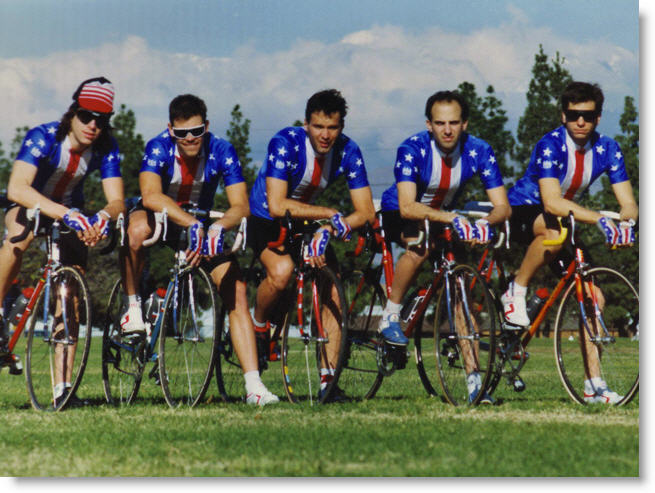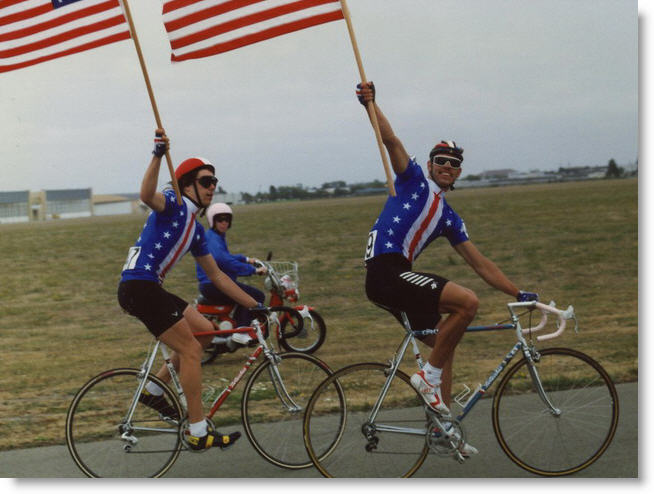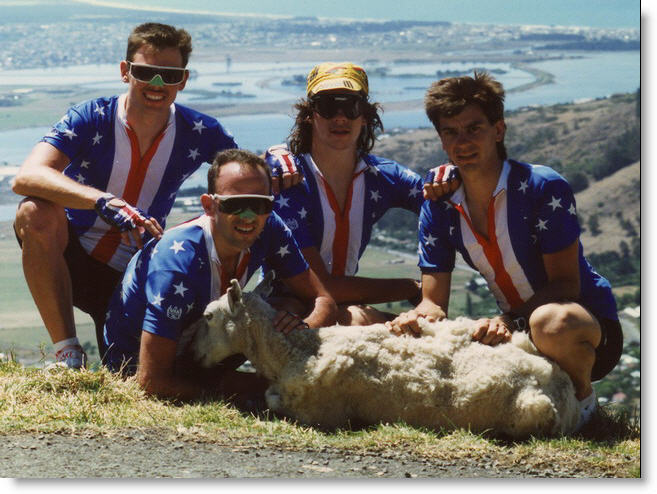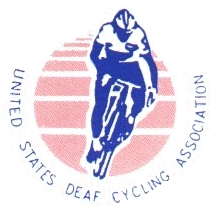|
16th World Games of the Deaf in Christchurch, New Zealand
Opening date: 7 Jan 1989
Closing date: 17 Jan 1989
Nations: 30
Athletes: 959
Sports: 12

Jon Schmitz, 19, of Santa Rosa, California,
Paul Wood, 21, of San Ramon, California,
Dusty Smith, 31, of Clinton, Tennessee,
Ralph Fernandez, 25, of Los Angeles, California and
Richard Machado, 27, of Fremont, California
Bobby Skedsmo of Union City, California as the USA cycling team coach (not in the picture)
The cycing team remained a dominance in the match sprint event since they won first gold and silver medal at the 1985 Los Angeles Games. Paul Wood and Jon Schmitz showed their versatility by winning from the front, from the back, and in one instance, by jumping with 200 meters to go and taking a flyer to the finish. They seemed to be toying with their opponents. Jon confronted with his own country opponent, Paul. He seemed to be in command tactically. He pinned Paul back and zoomed down the strip to easily win the first ride. In the second, he neatly came off Paul's wheel for a first Gold at the games of that day. Richard Machado managed to take a respectable a fifth place. Ralph Fernandez fought his way back through the repechage many times that wore him out taking a sixth place.

Jon Schmitz - Paul Wood
The individual time trial had always been a "showcase" for technology. The favored Ootman of New Zealand, who won a gold medal at the Koln and Los Angeles Games, kept on pushing and completed the ride. He struck an Olympic Gold again.
The 110-kilometer road race course, about 15 minutes southwest of Christchurch, was set against a beautiful backdrop of crater mountains and sheep country. But despite such attractive venue, spectator attendance was low, as it was for most other sports at the Games, compared to the 200,000 people who lined the '84 Olympic Road Race. Nevertheless, all 244 starters enjoyed contender status given the flat, 110-kilometer course. With just 300 feet of climbing on each of the 13 loops and a calm, warm day, it was anyone's race. Indeed, after just one lap, Tindall of New Zealand stirred the crowd by going off the front alone for two laps. He was soon joined by the pack from the behind. On the fourth lap, four riders ( D'Hondt of Belgium, Moran of Australia, Lee of Korea and Fontanive of Italy ) pushed the break to a 1-1/2 minute margin over the pack through several laps. The breakaway was down to 3 riders. By the 10th lap, the peloton was together again. Fortunately, the U.S. team did not expend any energy chasing this illfated break. Just after 10th lap, the key. breakaway formed when Italian Dollorenzo attacked and only American Schmitz and Belgian Troch could go with him. American Wood bridged up with three riders later. The four riders attacked each other to keep the speed high and managed to maintain a 30-minute lead.
By the final corner, the wild cries coming from a spectator filled roadway leading to the finish line, (estimated at 300), entertained themselves between laps with national war cries, beer, french fries, and hot dogs; the peloton remaining more or less intact in preparation for the final fireworks. It looked like exciting stuff-Italian Dollorenzo, making his move, teeth gritted, his head and well-built torse tucked low as his legs pumped like pistons; American Schmitz, in his wake, intelligently bidded his time for the right moment to initate the final sprint, so was certain of the outcome that he raised his arms in victory. First Gold for the America from the road race event! Schmitz came to the W.G.D. for first time still looking fresh out of high school! Italian Dollorenzo skillfully maneuvered for the silver medal by grasping Schmitz's rear wheel before American Wood could get a hold of it. Despite strongly riding, Wood was beset with mechanical problem throughout the race which may cost his valuable energy. Belgian Troch was a little lagged but took a respectable fourth place. Meanwhile, behind them, ten furious field sprinters formed for the fifth place. Belgian D'Hondt won. Ralph Fernandez rolled over the line in the back of pack - 14th place and was drained after the effort. He-was able to grind along but he had no snap.

Catching this sheep made their trip to New Zealand complete!
In the 50-kilometer points race event that's often compared to a lottery, both American Jon Schmitz and Paul Wood, pre-race favorites, knew what numbers to play. This new event, just introduced to the Games known as the 50 km Criterium, was proposes' by Coach Skedsmo several years ago. The race covered 25 laps of flat course around the university perimeter road, with sprint points awarded every 5 laps for first thru fifth place and one point awarded every lap for first place only. For the final sprint, the points were doubled. Everyone was fighting to get to the front except the Italians. American Schmitz and Wood outmuscled all others for the first fifth lap points. The best teamwork of the 50-kilometer points race belonged to the two Italians who masterfully employed their strategy to take off on a team-solo effort after the bunch slowed down for the recovery period. On the other side of course, another Italian went immediately to the front to slow down the bunch that enabled the Italians up the front to expend time for lead and simply accumulate points. Meanwhile, the lagging bunch were looking at each other for the less points. But American Schmitz seemed to enjoy this one the most and won all third place points, except one that belonged to a Japanese Oda. Coach Skedsmo commented that Schmitz had talent, but whether he had motivation and commitment is questionable after he on the first two gold medals. He eventually settled for bronze medal place. With conscience, did these two Italians win this one gracefully or come in vain? Certainly, the beaming Italians grasped their moment in Olympic criterium racing history! The 50 kilometers were covered in 1:14:42.55, an average of 24.95 m.p.h.


|

![]()

![]()